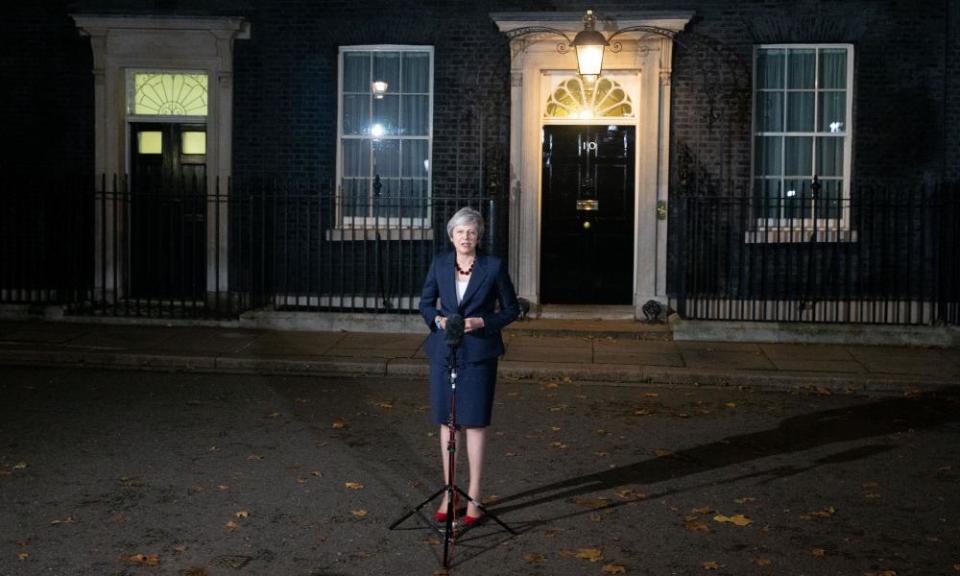Splits, cracks and difficult days: what the papers said about May's cabinet deal

Thursday’s front pages feature an impressive variety of treatments of Theresa May’s Brexit agree but the overwhelming majority are united in casting doubt on the prospects of the deal and the prime minister herself.
The Guardian sums up the scale of division that reigns, with the headline: “May Brexit plan: a split cabinet, a split party and a split nation” and mentions the 11 dissenting voices at Wednesday’s cabinet meeting.
GUARDIAN: May Brexit plan: a split cabinet, a split party and a split nation #tomorrowspaperstoday pic.twitter.com/Ee7WFIBP4U
— Neil Henderson (@hendopolis) November 14, 2018
The Daily Telegraph omits Boris Johnson from its front page and uses May’s own words to describe the situation: “There will be difficult days ahead.” It talks of the prospect of a leadership challenge in the intro, and also gives plenty of space to criticisms of the deal by Nick Timothy, the prime minister’s former chief of staff.
TELEGRAPH: ‘There will be difficult days ahead’ #tomorrowspaperstoday pic.twitter.com/vosrBWixE1
— Neil Henderson (@hendopolis) November 14, 2018
The Times says May “papers over the cracks” and suggests she used the threat of no Brexit at all to force ministers to agree to her draft agreement.
THE TIMES: May papers over the cracks #tomorrowspaperstoday pic.twitter.com/pLiFmIvR2g
— Neil Henderson (@hendopolis) November 14, 2018
The Daily Mail continues its coverage in a post-Dacre era with a remarkably upbeat front page. It reports on the threat of a “coup within days” but the headline strikes a defiant tone alongside an image of May: “I stand to fight.”
Thursday’s @DailyMailUK #MailFrontPages pic.twitter.com/eE3PZsXG80
— Daily Mail U.K. (@DailyMailUK) November 14, 2018
The i focuses on the cabinet meeting ructions with: “Cabinet split on whether to back PM” and lists out the divisions and sticking points ahead.
I: Cabinet split on whether to back PM #tomorrowspaperstoday pic.twitter.com/6LPF0QRiD8
— Neil Henderson (@hendopolis) November 14, 2018
A couple of the more visually strong fronts now. The New European will no doubt spark a visceral reaction among some readers with its image of May just about keeping her head above the water as the rain comes down. The words: “May’s last gasp deal.”
NEW EUROPEAN: May’s last gasp deal #tomorrowspaperstoday pic.twitter.com/sCqetIQsCa
— Neil Henderson (@hendopolis) November 14, 2018
The Sun has its fun with “We’re in the Brexs*it” (their asterisk, not ours) and reports that May’s “soft” deal threatens “to blow the government apart”, presumably even more than it is already. It is a far cry from its celebration of the referendum result, all that time ago.
Tomorrow’s @TheSun splash: We’re in the Brexs*it pic.twitter.com/dgsVN06CRo
— Andy Silvester (@silvesterldn) November 14, 2018
The Mirror homes in on the ministerial divisions with “War cabinet” and claims 40 Tory rebels are plotting to bring her down.
DAILY MIRROR: War Cabinet #tomorrowspaperstoday pic.twitter.com/epSnOZAT94
— Neil Henderson (@hendopolis) November 14, 2018
The Financial Times plays it straight, saying May has won cabinet support for her deal after “ferocious debate” and now faces a fresh battle in parliament. Its image choice is a side-on view of May bent forward as she makes her very lonely-looking speech to the nation.
FINANCIAL TIMES: May braced for Backlash after winning ferocious Brexit battle #tomorrowspaperstoday pic.twitter.com/C0jeAFPrWx
— Neil Henderson (@hendopolis) November 14, 2018
Metro presents the issue as a binary options, with a simple “Back May or sack May”.
METRO: Back May or Sack May #tomorrowspaperstoday pic.twitter.com/z4A0Utc1q4
— Neil Henderson (@hendopolis) November 14, 2018
The Express paints the rosiest picture as far as May is concerned, with no mention of leadership challenges or cabinet troubles, referring only to a “stormy five-hour meeting”. “It’s my deal … or no Brexit” is the headline.
EXPRESS: Its my deal....or no Brexit #tomorrowspaperstoday pic.twitter.com/IUqSUnqpQs
— Neil Henderson (@hendopolis) November 14, 2018
The Scotsman carries a dim view of May’s remaining time in office and mentions Nicola Sturgeon’s view on the deal, saying: “UK must return to the negotiating table.”
THE SCOTSMAN: May survives battle with her Cabinet .... but for how long? #tomorrowspaperstoday pic.twitter.com/gYLF466Wmy
— Neil Henderson (@hendopolis) November 14, 2018
The National gives more prominence to Sturgeon and says May is clinging on to power alongside a slightly spooky image of the PM walking out of No 10.
THE NATIONAL: PM May clings on for now...#tomorrowspaperstoday pic.twitter.com/dH4gw8cyPd
— Neil Henderson (@hendopolis) November 14, 2018
Online, the Irish Times goes the way of the Telegraph, quoting May on the “difficult days ahead” and focusing on her words rather than the struggles she faces. It carries a line about Taoiseach Leo Varadkar’s broad approval of the deal.
Belfast’s News Letter says May has cleared the “first hurdle” in her battle to ratify the deal which serves to remind that, more than two years since the referendum, the challenges are just beginning.
On the continent some of the early coverage appears positive. Le Figaro possibly assigns more power to May than most in the UK would, with the headline: “May imposes her Brexit agreement on her team.” Le Monde triumphantly carries May’s assessment of her cabinet success as a “decisive step” and calls it a success. Les Echos paints the weariest picture, referring to the pain May had to go through to get the support of her ministers.
In Germany, Der Spiegel feels May dodged a bullet. Die Zeit, Die Welt and Bild Zeitung focus on the cabinet success, something the Süddeutsche Zeitung refers to as an “important hurdle”.

 Yahoo News
Yahoo News 